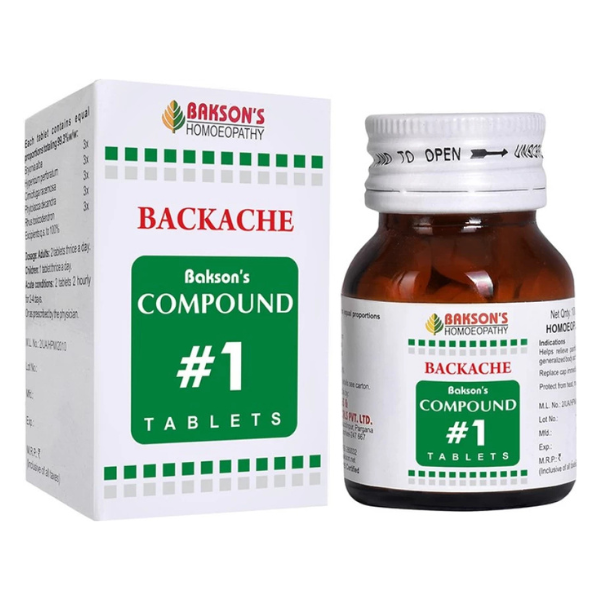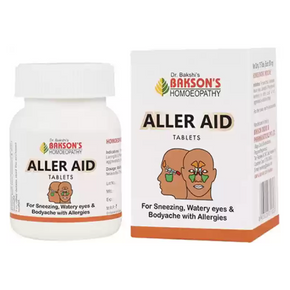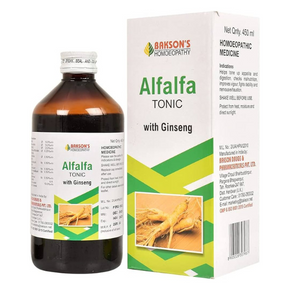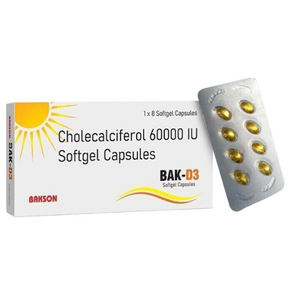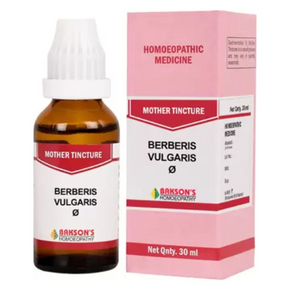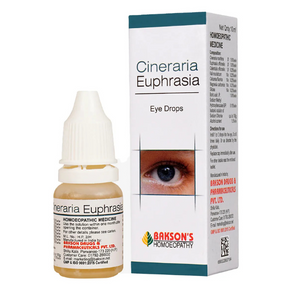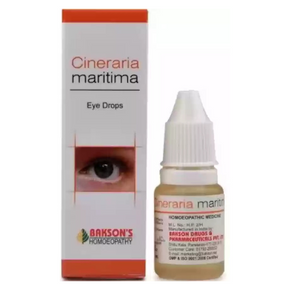- No products in the cart.
BAKSON'S HOMOEOPATHY COMPOUND # 1 BACKACHE TABLET - PACK OF 3 (100 TABLETS EACH)
No reviews
Rs. 405.00
Fulfilled By Planet Ayurveda
Size (Per Unit): 100 Tablets
Dosage: 2 tablets thrice a day for adult. 1 tablet thrice a day for children. Or as prescribed by the physician.
Suggested Products

DIAMOND STAR HERBAL TOOTHPASTE (100GM EACH)
Rs. 88.00

SANDALWOOD SOAP
Rs. 45.00
Categories
- Clinically Tested Products
- Classical Ayurvedic Products
- Ayurvedic Products for Pets
- Herbal Combo Packs
- Single Herbal Capsules
- Poly Herbal Capsules
- Single Herb Powders
- Herbal Powder Blends
- Beauty & Cosmetics
- Herbal Tablets
- Herbal Teas
- Herbal Juices
- Herbal Syrups
- Herbal Oils
- Premium Products Range
- All Ayurveda Brands
Browse by Category
Browse by Company
Browse by Health Concern
Description
Back pain is one of the most common complaints for which people visit the doctor or miss work due to disability. Lower back pain or Lumbago is not a disease but a symptom of several types of disorders. It can present as a dull aching in back, a stabbing or shooting pain radiating down the leg to foot, an inability to stand straight or as a decreased range of movement and restricted flexion of back.
Composition
Rhus toxicodendron 3x, Berberis vulgaris 3x, Ledum palustre 3x.
Indications
Helps relieve pain and stiffness of back owing to muscle strain, exposure to cold, age related wear and tear, urinary affections & after surgical procedures.
Dosage
2 tablets thrice a day for adult. 1 tablet thrice a day for children. Or as prescribed by the physician.
Contra-indication
None
Side effects
No known side effects
Types Of Low back Pain
-
Local Pain: caused by injury to pain sensitive structures that compress or irritate sensory nerve endings. Pain is located near the affected part of the back.
-
Pain referred to the back: pain with abdominal or pelvic origin which is unaffected by posture
-
Pain of spine origin: it is restricted to the back or referred to lower limbs or buttock
-
Radicular back pain: it radiates from spine to leg in specific nerve root territory. Cough, sneeze, lifting heavy objects or straining may elicit pain.
- Pain associated with muscle spasm: accompanied with dull or aching pain in the Para spinal region and abnormal posture.
Risk Factors
Factors that put an individual at greater risk of developing back pain are the following:
- Age more than 30 or 40 years.
- Lack of exercise
- Excess weight
- Diseases like arthritis and cancer
- Improper lifting technique
- Psychological conditions like depression and anxiety
- Smoking
Causes
Conditions that can commonly cause back pain are
1) Muscle or Ligament Strain
Sudden awkward movements, over-activity or incorrect lifting of heavy objects can cause strain to the back muscles and result in pain.
2) Intervertebral Disk Prolapse
A prolapsed or herniated disc occurs when the nucleus pulposus ruptures out from its enclosed space due to injury to the outer fibres of intervertebral disc and can cause compression to the spinal nerves. It presents with back or neck pain, numbness, or tingling in extremities, weakness, pain running down the limbs, etc.
3) Osteoarthritis
It is the most common type of arthritis which can affect the hip and spine to cause backache. There is stiffness after rest or in the morning, joint movement restriction, joint instability and deformity and crepitation in the joint.
4) Osteoporosis
Osteoporosis makes the bones porous and brittle making it easier to develop painful fractures of spinal vertebrae.
5) Other causes are
- Degenerative spondylolisthesis
- Cauda equina syndrome
- Fungal or bacterial infection of spine
- Renal stones or kidney infections
Management
Measures that can help prevent and ease back pain are
- Avoid heavy lifting
- Strengthen the core muscles
- Improve posture
- Regular stretching can help improve circulation
Action of Ingredients
- Rhus toxicodendron: Rhus-t. affects the fibrous tissue, joints, tendons, sheaths, etc., producing pains and stiffness. Rheumatism in the cold damp season. Stiffness of muscles and joints, feels better for a time from a change of position. Inclination to stretch and for Dislocated joints. Stretching causes cracking in knees, soreness in abdomen. Sciatica, better by warmth and from exercise.
- Berberis Vulgaris: Berb. is often useful in arthritic and hepatic disorders with urinary, haemorrhoidal or menstrual complaints. Pains that rapidly change their locality and character. Pains are radiating from one point, shooting outward or all over, sticking, burning, smarting, soreness. Pains may be felt all over body, emanating from small of back. Indicated in Spinal irritation. Movement aggravates the complaints. Tearing, burning pains or bubbling sensation in joints.
- Ledum Palustre: Ledum affects the fibrous tissue of joints, especially ankles, tendons, heels and skin, hence it can be called a rheumatic remedy, where rheumatism begins in the feet and travels upwards. Affected parts become purple puffy and then emaciate.
For the rheumatic diathesis, functional pain, altered secretions, deposits of solid, earthy matter in the tissues. Rheumatism begins in feet and travels upward. Painful, cold, oedematous joints with Shifting, tearing pains. Weakness and numbness of the affected parts.
Disclaimer
The information provided herein on request, is not to be taken as a replacement for medical advice or diagnosis or treatment of any medical condition. DO NOT SELF MEDICATE. PLEASE CONSULT YOUR PHYSICIAN FOR PROPER DIAGNOSIS AND PRESCRIPTION.
Talk to our Experts
Our trusted experts can help you choose the right products for your health.
Book Your Consultation Now



















.png?v=1695813493)














